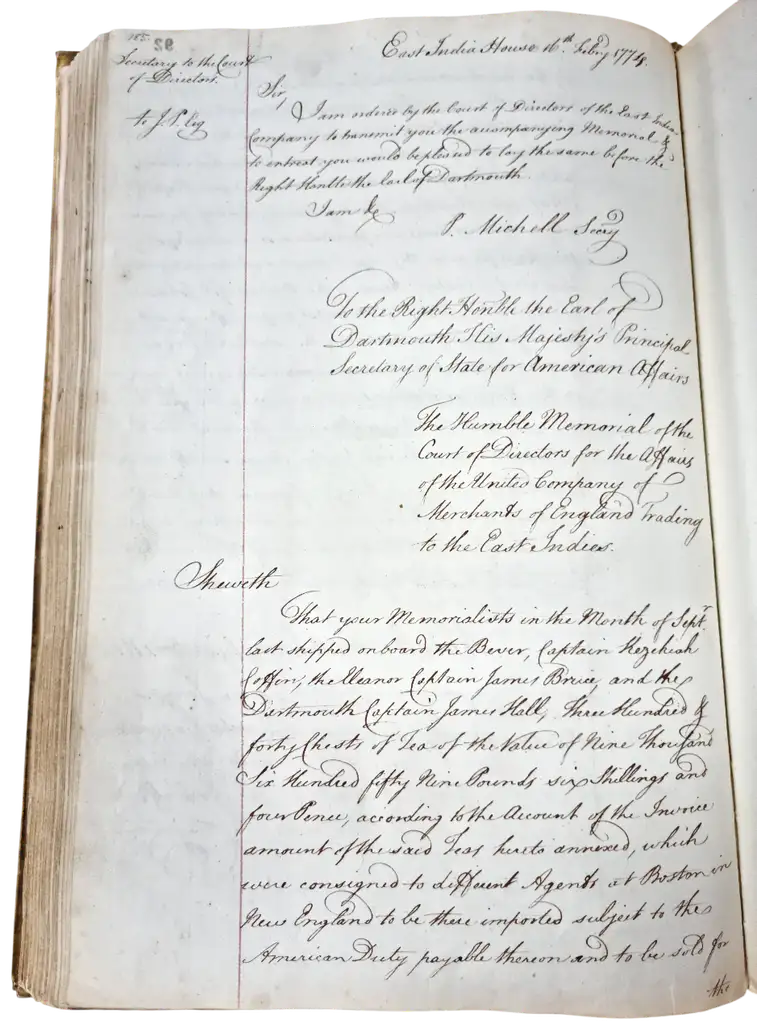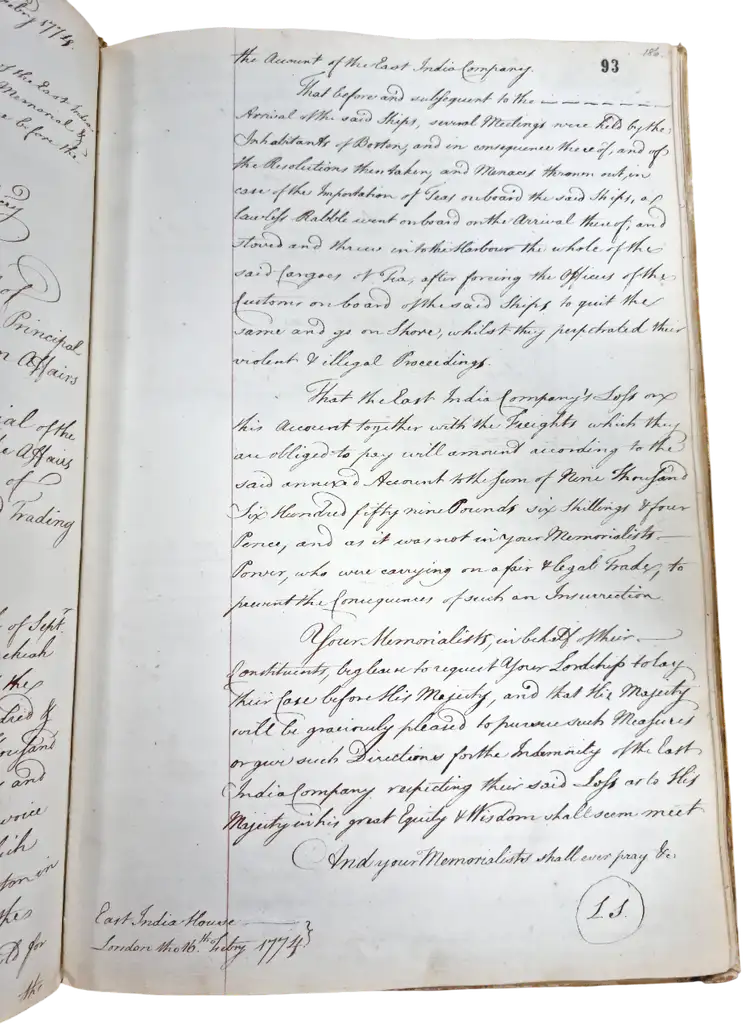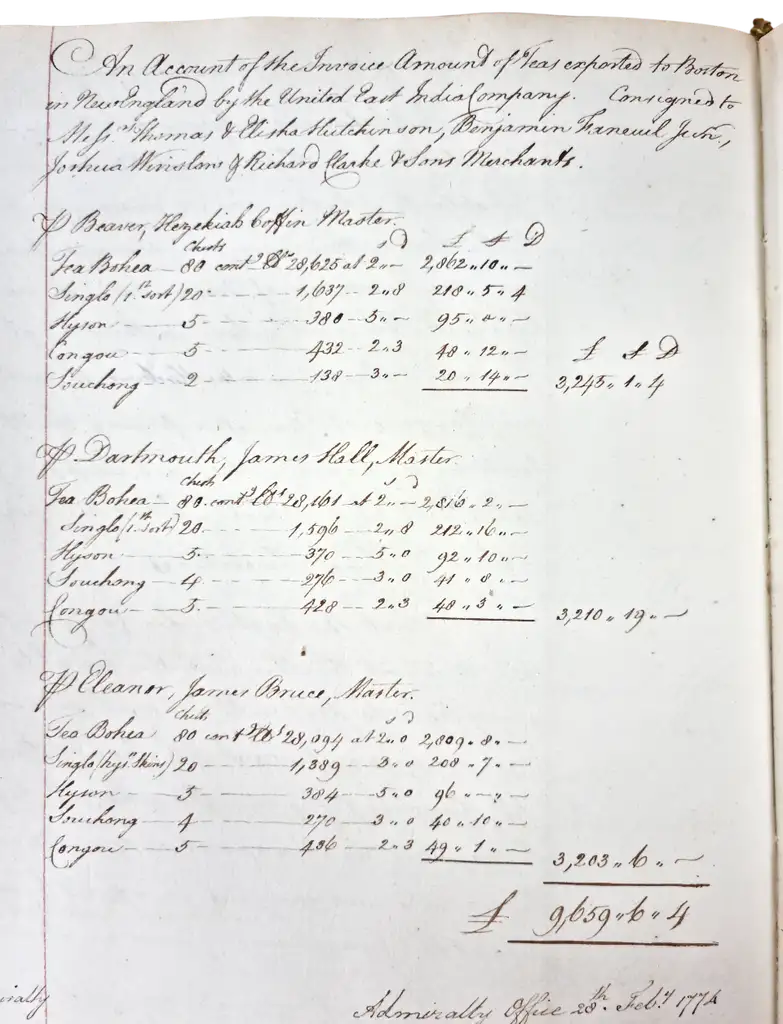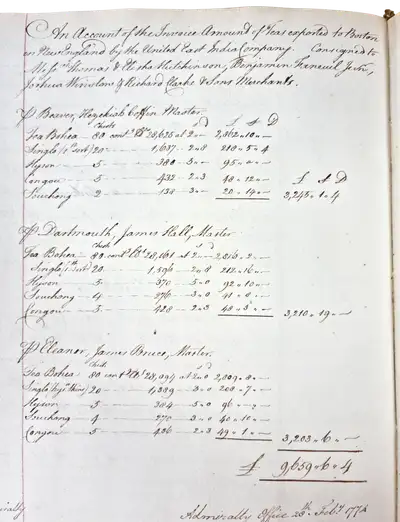Record revealed
Request for compensation for the Boston Tea Party
On 16 December 1773, American colonists threw 340 chests of tea into Boston harbour in an event now known as the Boston Tea Party. This letter from the East India Company gives a breakdown of teas destroyed – and asks for reimbursement.
Images
Image 1 of 3

First page of the East India Company's letter
Partial transcript
To the Right Honourable the Earl of Dartmouth His Majesty’s Principal Secretary of State for American Affairs.
The Humble Memorial of the Court of Directors for the Affairs of the United Company of Merchants of England trading to the East Indies.
Sheweth,
That your memorialists in the month of September last shipped on board the Beaver, Captain Hezekiah Coffin, the Eleanor, Captain James Bruce, and the Dartmouth, Captain James Hall, three hundred & forty chests of tea of the value of nine thousand six hundred fifty nine pounds six shillings and four pence, according to the account of the invoice amount of the said teas hereto annexed, which were consigned to different agents at Boston in New England to be there imported subject to the American Duty payable thereon and to be sold for the
Image 2 of 3

Second page of the East India Company's letter
Partial transcript
account of the East India Company.
That before and subsequent to the arrival of the said ships, several meetings were held by the inhabitants of Boston, and in consequence thereof, and of the resolution then taken, and menaces thereon out, in case of the importation of teas onboard the said ships, a lawless rabble went onboard on the arrival thereof, and stored and threw in to the harbour the whole of the said cargoes of tea, after forcing the officers of the customs on board of the said ships to quit the same and go on shore, whilst they perpetrated their violent & illegal proceedings.
That the East India Company’s loss on this account together with the freights which they are obliged to pay will amount according to the said annexed account to the sum of nine thousand six hundred fifty nine pounds six shillings & four pence, and as it was not in your memorialist’s power, who were carrying on a fair & legal trade, to prevent the consequences of such an insurrection.
Your memorialists, in behalf of their constituents, beg leave to request your lordship to lay their case before His Majesty, and that His Majesty will be graciously pleased to pursue such measures or give such directions for the indemnity of the East India Company respecting their said loss as to His Majesty in his great equity & wisdom shall seem meet.
And your memorialists shall ever pray &c,
Image 3 of 3

Account of the tea destroyed at the Boston Tea Party
Partial transcript
An Account of the Invoice Amount of Teas exported to Boston in New England by the United East India Company. Consigned to Messrs Thomas & [Elisha] Hutchinson, Benjamin Samuel John, Joshua Winston & Richard Clarke & Sons Merchants.
Beaver, Hezekiah Coffin, Master.
[First line of the table represented here as text]
Tea: Bohea
Chests: 80
lbs: 28,625
Price/lb: 2s
£: 2,862
s: 10
d: -
Why this record matters
- Date
- 16 February 1774
- Catalogue reference
- CO 5/247
In 1763 Britain signed the Treaty of Paris, becoming the dominant imperial power in North America. Parliament then sought to tax their subjects in America to recover from a costly war with France, and to better defend those colonies from future invasion.
This uncovered deeply opposing views. Parliament believed that they had the right to levy taxes upon all subjects within King George III’s dominions, while British subjects living in America thought differently. They were not against paying taxes to the British Crown, but believed that they should set those taxes, and be represented in Parliament.
The Tea Act, passed in spring 1773, brought this tension to a head. The act aimed to help the East India Company, which faced financial difficulties, by giving it a monopoly on the tea trade with the American colonies. It also hoped to encourage the payment of tea duties in America.
Instead, colonists sent the tea ships arriving to Philadelphia and New York back to Britain. In Charleston, tea ships' cargo was left unopened on the docks to waste. In Boston, colonists refused to let tea be unloaded – leading to that fateful night now called the Boston Tea Party, where demonstrators threw chests of it into the harbour.
As the owner of that tea, the East India Company wrote this letter to the British government in early 1774, requesting compensation for the lost cargo. It gives a detailed breakdown of teas destroyed when, in the company's words, 'a lawless rabble went onboard on the arrival thereof, and stored and threw in to the harbour the whole of the said cargoes of tea'.
Pressure on the British Government to compensate the East India Company, and to prosecute the ringleaders of the Boston Tea Party, led to the enactment of the so-called Intolerable Acts. These were sanctions on trade and government in Boston and Massachusetts that were fiercely rejected in the British colonies of North America.
These acts permanently damaged the relationship between Britain and its colonies in North America, directly contributing to the American Revolutionary War and, ultimately, the United States' Declaration of Independence in 1776.
